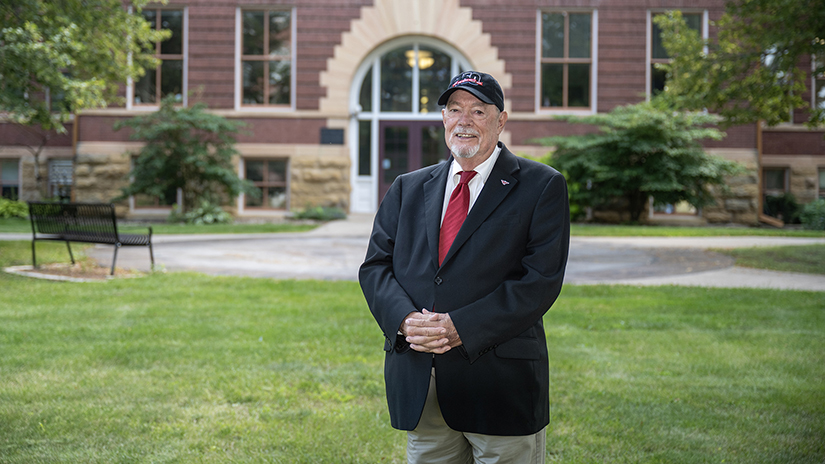UNIVERSITY OF WISCONSIN River Falls
Newsroom
 Michael Martin starts this academic year as interim chancellor at UW-River Falls, replacing his friend and former colleague Maria Gallo. Martin said he hopes to shepherd the university through budget difficulties and build on its many strengths. UWRF photo.
Michael Martin starts this academic year as interim chancellor at UW-River Falls, replacing his friend and former colleague Maria Gallo. Martin said he hopes to shepherd the university through budget difficulties and build on its many strengths. UWRF photo.
Interim chancellor brings five decades of experience to job
Oct. 7, 2024 - When Michael Martin sent an email message to his former colleague Maria Gallo in June, he hoped to speak as a guest lecturer at the University of Wisconsin-River Falls, where Gallo was chancellor, while visiting family in the Twin Cities.
Instead, Martin finds himself leading the university, having been named interim chancellor by Universities of Wisconsin President Jay Rothman on Aug. 1, when Gallo announced her retirement.
“I didn’t expect to be leading this university,” Martin said. “It certainly wasn’t something that I planned on. But after talking about it with Maria, it seemed like maybe I could step up and help. I want to use my experience to help this university.”
Martin followed his initial email exchange with Gallo with an in-person meeting at which Gallo told him she planned to retire. She was delaying her retirement until she could find an interim replacement she thought would be a good match for UWRF. After speaking with Martin about her plan to step down, she was convinced he was just the person to serve as interim. She recommended him to Rothman.
“He seems like the right fit at the right time,” said Gallo, who worked with Martin at the University of Minnesota and the University of Florida. “Mike has all of this experience, so many situations that he has been through and dealt with. He has pretty much seen it all. And he has a deep sense of the value of regional comprehensive universities like UWRF and the important role they play.”
Martin, 77, certainly has plenty of experience in higher education. During his 53 years in the field, Martin has served as president of New Mexico State University, chancellor at Louisiana State University and Colorado State University, and most recently as president of Florida Gulf Coast University.
In addition, he worked in numerous faculty and administrative jobs at the University of Minnesota and has Wisconsin connections, having started his education career as an economics teacher at UW-Eau Claire.
After a career that has involved leading four large universities, why take on the interim job at UWRF? Martin said he decided to work as interim chancellor in large part because of the important role of the university to students and to the surrounding community.
“I have developed this notion that the regional comprehensive universities like UWRF have taken up the mission to be the people’s universities,” he said. “Places like this play a profoundly important role in higher education. These smaller schools provide students with a ladder to a better life and career, and that benefits our society in so many ways.”
Martin praised UWRF’s faculty and programs as strengths. The Science and Technology Innovation Center (SciTech) currently under construction and scheduled to open in January 2026 will provide new instruction, research and internship opportunities for students and will foster increased partnership opportunities between the university and businesses, he said. Being near the Twin Cities is an advantage, he said.
“There is a real affection for and a commitment to this university,” he said.
Martin knows firsthand the positive difference a regional university can make. He is a first-generation college student who got his higher education start at Minnesota State University, Mankato (then known as Mankato State University). UWRF plays a similar role for so many students to find success, he said.
“Places like UWRF are powerful engines in this state that don’t get enough credit for all they do,” Martin said. “We often worry too much about prestigious rankings. What I think is elite is taking a student with a 23 score on the ACT and turning out a graduate who is a high-quality employee and who makes a positive difference in society.”
Martin becomes interim chancellor at a challenging time. Like some other Universities of Wisconsin schools, UWRF faces budget cuts. Martin acknowledged the university’s financial difficulties and the possibility of layoffs and program reductions. New revenues would reduce cutback amounts, he said, noting some universities are outsourcing parts of operations that are not a part of their core mission.
“There are challenges here to be sure,” he said. “I don’t want to minimize that. But we are in better shape than a lot of universities around the country. I think we have real opportunities here.”
Among those, Martin said, is continuing to build on two successive years of increased first-year student enrollment. Higher student numbers, combined with improved retention efforts, will go a long way toward improving the bottom line, he said. Continuing to offer strong academic programs and creating new ones will help attract students.
“I am honored to have this opportunity to work with talented people here at UWRF,” Martin said. “If, while I’m here, I can help move this institution a bit further toward the bright future we have ahead of us, that is a contribution I want to make.”










